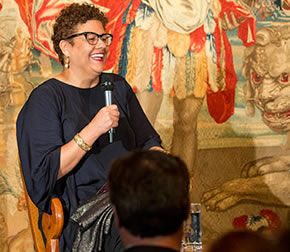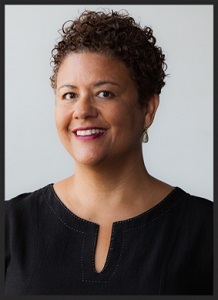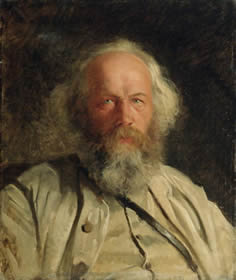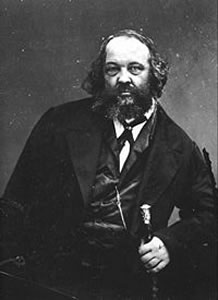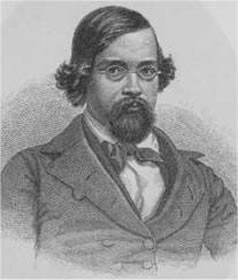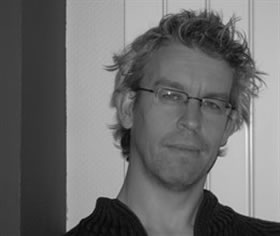De Russische schrijver en anarchist Michail Alexandrowitsj Bakoenin werd geboren in Prjamuchino op 30 mei 1814. Op zijn veertiende vertrok hij naar Sint-Petersburg waar hij een militaire opleiding volgde bij de Universiteit van de Artillerie. Na zijn opleiding ging hij werken in de Keizerlijke Garde, maar in 1835 diende hij zijn ontslag in, omdat hij zich niet kon verenigen met het despotisme tegen de Polen dat hij moest aanschouwen. Vervolgens werkte Bakoenin in Moskou en Sint-Petersburg aan vertalingen van werken van auteurs als Fichte en Georg Hegel. In 1842 vertrok hij naar Duitsland om Hegel te bestuderen. Hier kwam hij in aanraking met Duitse socialisten, en reisde hij naar Parijs waar hij Pierre-Joseph Proudhon en George Sand ontmoette. Hij nam deel aan de opstand in Dresden (1849) wat zorgde voor een arrestatie en een terdoodveroordeling. Deze werd echter omgezet in levenslange opsluiting; Bakoenin werd uitgeleverd aan Rusland en naar Siberië gestuurd. In 1861 wist Bakoenin te ontsnappen en via Japan en de Verenigde Staten West-Europa te bereiken. Bakoenin was een anarchist die regerende machten in alle hoedanigheden verwierp: van God tot aan menselijke autoriteit, zoals de staat. Tevens was hij voor gelijkwaardigheid, waarmee hij het idee van een bevoorrechtte klasse afwees.
Uit: God and the State
“Who is right, the idealists or the materialists? The question, once stated in this way, hesitation becomes impossible. Undoubtedly the idealists are wrong and the materialists right. Yes, facts are before ideas; yes, the ideal, as Proudhon said, is but a flower, whose root lies in the material conditions of existence. Yes, the whole history of humanity, intellectual and moral, political and social, is but a reflection of its economic history.
All branches of modem science, of true and disinterested science, concur in proclaiming this grand truth, fundamental and decisive: The social world, properly speaking, the human world – in short, humanity – is nothing other than the last and supreme development – at least on our planet and as far as we know – the highest manifestation of animality. But as every development necessarily implies a negation, that of its base or point of departure, humanity is at the same time and essentially the deliberate and gradual negation of the animal element in man; and it is precisely this negation, as rational as it is natural, and rational only because natural – at once historical and logical, as inevitable as the development and realization of all the natural laws in the world – that constitutes and creates the ideal, the world of intellectual and moral convictions, ideas.
Yes, our first ancestors, our Adams and our Eves, were, if not gorillas, very near relatives of gorillas, omnivorous, intelligent and ferocious beasts, endowed in a higher degree than the animals of another species with two precious faculties – the power to think and the desire to rebel.”

Michail Bakoenin (30 mei 1814 – 13 juni 1876)
Zelfportret uit 1838
De Duitse dichter en schrijver Georg Schaumberg werd geboren op 30 mei 1855 in Ansbach. Zie ook mijn blog van 30 mei 2009.
Redoutenlied – Tragödie
Beim ersten Walzer, da sahen wir uns:
“Ich kenne dich, reizende Dame”
Sie neigte das Haupt und sprach verschämt:
Längst steht ja im ´Kürschner´ mein Name.”
Die Polka gab uns Gelegenheit
Zur literarischen Enquete.
Sie sprach: “Sie wache im Ibsen auf
Und ginge mit Nietsche zu Bette.”
Beim Schottisch dann: “Trotz Mann un dKind
fühle nimmer sie sich gebunden,
Denn ihre Rente sei hoch und fest.”
Da hatten wir schnell uns gefunden.
Und als der zweite Walzer enklang
Hörte sie seufzend mein Werben:
“Auf ewig, Liebster, bin ich nun dein,
Und in Schönheit laß uns einst sterben.”
Kaum schwur ich´s beim Mumm, da folgte schon
Dem Freudenrausch lähmende Stille…
Warum verlorst du den falschen Zopf,
O Weib, schon bei der Quadrille!
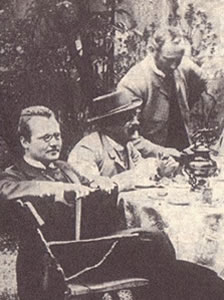
Georg Schaumberg (30 mei 1855 – 2 maart 1931)
Leden van de Gesellschaft für modernes Leben: vlnr: Otto Julius Bierbaum, Georg Schaumberg, Oskar Panizza (rond 1893).
De Franse dichter, schrijver en fotograaf Félix Arnaudin werd geboren op 30 mei 1844 in Labouheyre in het departement Les Landes. Hij was de eerste die de Haute-Lande en de oorspronkelijke bewoners ervan onder de aandacht bracht. Arnaudin was zowel taalkundige, folklorist, historicus, antropoloog, fotograaf en schrijver. Zijn werk richtte zich op het verzamelen van verhalen en liedjes in de Gascogne, op de fotografie van landschappen, bewoners, herders en boeren. Zijn geboortehuis is nu in plaats van lopende fototentoonstellingen door de gemeente Labouheyre.
Uit: Chants populaires de la Grande Lande
« Que de choses aimées dont chaque jour emporte un lambeau ou qui ont déjà disparu et ne sont plus qu’un souvenir ! La lande elle-même, par-dessus tout, où flottait, lointaine, à demi éteinte, d’autant plus grande dans son silence, la lente complainte du pâtre ou du bouvier perdus au vague de l’espace, et aussi, tant douce à ouïr au voisinage des parcs taciturnes, la fraîche cantilène des coupeuses de bruyère, vibrant dans la torpeur de ses pâles vesprées d’arrière-saison ; la lande infinie abandonnée sans partage à la vie pastorale, et endormie -à jamais, semblait-il, mais des temps nouveaux sont venus brutalement briser le charme- dans son vieux rêve d’immensité et de solitude… Maintenant, la lande n’existe plus. Au désert magnifique, enchantement des aïeux, déroulant sous le désert du ciel sa nudité des premiers âges, à l’étendue plane, sans limites, où l’oeil avait le perpétuel éblouissement du vide, où l’âme, élargie, enivrée, tantôt débordait de joies neuves et enfantines, tantôt s’abîmait dans d’ineffables et si chères tristesses, a succédé la forêt, -la forêt industrielle ! avec toutes ses laideurs (…), dont l’étouffant rideau, partout étendu où régnait tant de sereine et radieuse clarté, borne implacablement la vue, hébète la pensée, en abolit tout essor ».
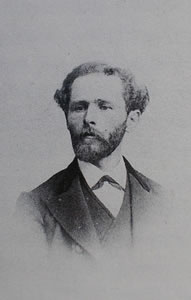
Félix Arnaudin (30 mei 1844 – 6 december 1921)
De Duitse dichter en schrijver Robert Eduard Prutz werd geboren op 30 mei 1816 in Stettin. Zie ook mijn blog van 30 mei 2009.
Gesetz der Liebe
Wenn du dein Herz der Liebe willst ergeben,
So acht’ auf Eins: daß es sich völlig giebt
Und ungetheilt; es lebt nur, wer da liebt,
Drum klingt so ähnlich lieben auch und leben.
Drum wenn du liebst, so habe nichts daneben,
Woran dein Herz noch hängt; die Welt zerstiebt
Der Seele, die sich innigst weiß geliebt,
Und welche selbst in Liebe will verschweben.
Wer aber unter des Geliebten Küssen
Noch ängstlich seitwärts nach den Leuten schielt,
Was sie wol meinen, denken, sagen müssen,
Der ist, wie fromm er sich auch sonst verhielt,
Rebell zuwider göttlichen Beschlüssen,
Und eitel Täuschung ist, was er erzielt
Robert Prutz (30 mei 1816 – 21 juni 1872)
Onafhankelijk van geboortedata:
De Vlaamse dichter Jan Geerts werd geboren in Hoogstraten in 1972. Geerts is schrijfdocent en dichter. Hij publiceerde verscheidene gedichten in diverse tijdschriften, tot hij in 2004 bij Uitgeverij P debuteerde met de bundel Tijdverdriet en andere seizoenen. In 2005 volgde Een volle maan met onze handen ernaast.
Een vogel
Een vogel is een vis die niet kan vliegen.
Een vogel is een vis die niet zonder water kan
en op het droge snakt naar lucht.
Een vogel is een vis die hoog moet
omdat hij lijdt aan dieptezucht.
Een vogel moet landloos balanceren
op de horizon tussen verlangen en vlucht.
Een vogel is een vis die tegen de hemel
kleeft, een beest dat zijn lot lipleest.
Maar een vogel is en blijft een vis.
Jan Geerts (Hoogstraten, 1972)
De Vlaamse dichter, schrijver en wetenschapper David Van Reybrouck werd geboren in Brugge in 1971. Zie ook mijn blog van 30 mei 2009.
Witloof
Zoals witloof,
niet de wortel die men breekt
en keert in de ast, maar de koele
kwetsbaarheid van het tere blad
zoals het donkerte wil om wit te zijn
en kilte zoekt om bitter te worden
en breekbaar blijft en bleek –
een bundel ongebroken verlangen
zoals het roerloos groeit,
een leger van stilte,
en opflakkert bij het licht van een lamp
een korte groet uit hun grot van roest
zoals volmaakte vlammen
van een ondergronds branden
David van Reybrouck (Brugge, 1971)
Zie voor onderstaande schrijvers ook mijn blog van 30 mei 2009.
De Mexicaanse dichteres Pita Amor (pseudoniem van Guadalupe Teresa Amor Schmidtlein) werd geboren op 30 mei 1918 in Mexico-Stad. Zie ook mijn blog van 30 mei 2007.
De Surinaamse jurist, schrijver en politicus Eduard Johan (Eddy) Bruma werd in Paramaribo geboren op 30 mei 1925. Zie ook mijn blog van 30 mei 2008.
